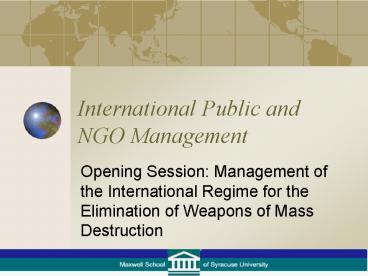International Public and NGO Management - PowerPoint PPT Presentation
1 / 27
Title:
International Public and NGO Management
Description:
International Public and NGO Management. Opening Session: ... Read quickly-- real international officials are inundated by documents. Discussion sections ... – PowerPoint PPT presentation
Number of Views:30
Avg rating:3.0/5.0
Title: International Public and NGO Management
1
International Public and NGO Management
- Opening Session Management of the International
Regime for the Elimination of Weapons of Mass
Destruction
2
The course uses Blackboard
Go to http//blackboard.syr.edu
3
The course is on the Maxwell web
4
You go to the Syllabus page
5
The Master Schedule is your guide
6
You navigate to the session page
7
The Lecture
- Only time in the course you will get a live
lecture - Lectures will be posted on-line, usually the
Friday previous - Read, view or listen to the lecture
- Sessions will be discussion
8
Readings
- Two texts required
- One text recommended
9
Other readings on-line
- Purpose of readings is to give you context and
additional information - Texts are all from practitioners
- Readings are usually official documents from
organizations - Read quickly-- real international officials are
inundated by documents
10
Discussion sections
- You should attend one discussion section each
week - In-person
- Friday, 930 a.m. (Maxwell Auditorium)
- Tuesday, 630 p.m. (Eggers 010)
- On-line
- Thursday, 8 a.m.
11
On-line
- Use Elluminate
- Go to Cotelco for the meeting
- http//cotelcocave.syr.edu/
- No password needed give yourself a nickname
(probably your name) - Recordings available almost immediately after
- Everyone can view the recordings
12
Management of the International Regime for the
Verification of the Elimination of WMD
- Case study of how the international public sector
addresses a global problem - Shows role of IOs
- Material derived from 2005 bookElimination of
Weapons of Mass Destruction Prospects for
Effective International Verification by
Andemicael and Mathiason (Palgrave 2005)
13
(No Transcript)
14
What is a regime?
- Krasners classic (1981) definition
- "an international regime is a set of principles
explicit or implicit norms, rules and
decision-making procedures around which
expectations of actors (States) converge in order
to coordinate actors behavior with respect to a
concern to them all
15
Regime components
- principles, norms, rules and decision-making
procedures. These are elements of institutions,
of regularity. - "Around which expectations of actors" It is
about expectations rather than actions. It is
cognitive and perceptual rather than active. - "converge in order to coordinate" The agreement
is to mutually affect possible behavior by
indirect means rather than by authoritative
means. - "a concern to them all". The collective pay-off
is considered more important than the individual
interest.
16
WMD Conventions
- ? The 1968 Treaty on the Non-Proliferation of
Nuclear Weapons (NPT), which entered into force
in 1970 and currently has 187 parties. - ? The 1996 Comprehensive Nuclear-Test Ban Treaty
(CTBT), which is not yet in force but has 165
signatories and 93 ratifications, including 31 of
the 45 annex II countries.. - ? The 1992 Convention on the Prohibition of the
Development, Production, Stockpiling and Use of
Chemical Weapons and on Their Destruction that
entered into force in 1997 and has 145 parties.
And - ? The 1972 Convention on the Prohibition of the
Development, Production and Stockpiling of
Bacteriological (Biological) and Toxin Weapons
and on their Destruction that entered into force
in 1975 and has 145 parties.
17
Why verification?
- States involved in the elimination of WMD
confront almost a classic version of the
Prisoner's Dilemma game. - States may be run by leaders who are unscrupulous
and irrational and who might not comply. - Non-state actors who, by definition, are not
bound by international conventions, might obtain
WMD from state or other non-state actors and pose
a threat.
18
Universal or coalitions of the willing?
- Can a non-universal regime work?
- Non-participants are not bound
- Cannot effectively verify non-parties
- Lack of linkages
- Example Iraq II
- Universal regimes are clearly preferred
19
Means of verification
- Declarations
- Trade Accounting
- Indirect Methods
- Inspections
20
Institutions
- IAEA
- CTBTO
- OPCW
- Biological weapons?
21
What does management have to do with this?
- Leadership
- Strategic planning
- Personnel
- Finance
22
The Civil Servant
http//www.un.org/womenwatch/daw/beijing/dawstaff.
htm
23
The role of civil society
24
The Biological Weapons Verification Organization
- The simulation
- You are the staff of BWVO
- Meet with the Director General weekly
- Work in teams (mandatory if in the in-person
session, optional for on-line) - Prepare first medium-term plan for the
organization (2008-2011)
25
Use the LogFrame
- Logical Framework used in most international
organizations - Method of thinking through a problem
- Sequence from defining the problem through
determining what to do about it and when
26
LogFrame matrix
27
Second weeks assignment
- Prepare a one paragraph statement of the problems
to be addressed in the BWVO plan and - A statement of the Overall Objective to be
pursued by the plan - Send to Professor Mathiason at jrmathia_at_maxwell.sy
r.edu - By September 4 for On-line session, September 5
for Friday session, September 7 for Thursday
session































